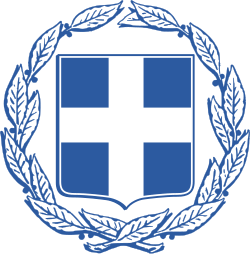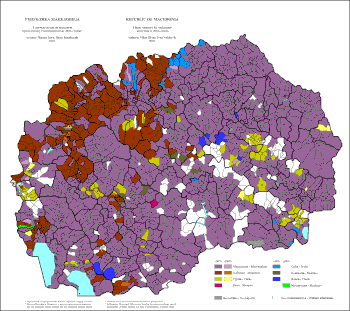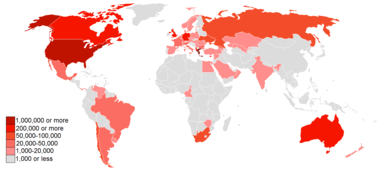Greeks in North Macedonia
Greeks (Macedonian: Грци, Grci [ɡr̩t͡si]) in North Macedonia form an ethnic minority, whose precise size is a few hundred per official estimates and ranges higher in Greek estimates.
| Languages | |
|---|---|
| Greek and Macedonian | |
| Religion | |
| Eastern Orthodox Church | |
| Related ethnic groups | |
| Ethnic Greeks |
Current status
Greeks are mainly settled now in the cities of Gevgelija (Greek: Γευγελή, Gevgelī́) and Bitola (Greek: Μοναστήρι, Monastī́ri).[1] Today most Greeks in the country are political refugees who fled Greece due to the Greek Civil War[2] and their descendants.[3] Ethnologue also cites Greek as an "immigrant language" in the Republic of North Macedonia.[4] The most recent census (2002) recorded 422 individuals declaring their ethnicity as Greek.[5]
Alternative estimates
The Greek right-wing party Popular Orthodox Rally claims via questions presented in the Greek Parliament that there are more than 100,000 (up to 280,000) Greeks that now live in the country.[6] This number is not supported officially by the Greek Ministry of Foreign Affairs. According to a Greek research, the Greek population of North Macedonia in 1996 made up 2% of the total population, consisting of approximately 42,000 individuals.[7]
Aromanian controversy
The controversy surrounding a Greek minority within the Republic of North Macedonia stems from the statistical treatment of Aromanian (Vlach) population groups, who in their majority have historically identified themselves as Greeks as part of the Rum millet.[8] A large number of Greek-identifying Vlachs left the region after the Balkan Wars, with Florina in Greece witnessing the arrival of a large Greek-speaking commercial population from Monastiri (Bitola).[9] The present-day community is a remnant of the formerly larger Aromanian Greek community of the part of Macedonia that fell within the borders of the Kingdom of Serbia after the Balkan Wars.[10][11][12][13][14][15][16] Representatives of Aromanian Associations of Bitola, Krusevo and Gevgelija take place in the Panhellenic Reunion of Aromanians every year and representatives of Sarakatsani Association of Skopje take place in the Panhellenic Congress of Sarakatsani, every two years.[17][18] On the other hand, the Aromanians in North Macedonia are an officially recognized minority group numbering ca. 10,000 people.
Notable historical personalities
The following people were born during Ottoman times in what is today North Macedonia:
- Theodoros Adam, chieftain of the Macedonian Struggle
- Charalambos Boufidis, chieftain of the Macedonian Struggle
- Petros Christou (1887-1908), chieftain of the Macedonian Struggle
- Georgios Karaiskakis (-1910), chieftain of the Macedonian Struggle
- Evangelos Koukoudeas, chieftain of the Macedonian Struggle
- Dimitrios Lalas (1844/48-1911), composer and musician
- Georgios Modis (1887-1975), jurist, politician, writer and participant in the Macedonian Struggle
- Traianos Nallis (1874-?), politician
- Pantelis Papaioannou (c.1880-1907), chieftain of the Macedonian Struggle
- Theofylaktos Papakonstantinou (1905-1991), writer and politician
- Anastasios Pichion (1836-1913), educator and participant the Macedonian Struggle
- Michail Sapkas (1873-1956), politician and doctor
- Dimitrios Semsis (1883-1950), violinist
- Michael Sionidis (1870-1935), chieftain of the Macedonian Struggle
- Alexandros Svolos (1892-1956), President of Political Committee of National Liberation during WW2
- Dimitrios Tsapanos (1882 or 1883-), chieftain of the Macedonian Struggle
- Dimitrios Tsitsimis, chieftain of the Macedonian Struggle
- Georgios Vafopoulos (1903-1996), poet, writer, teacher and journalist
- Antonios Zois (1869-1941), chieftain of the Macedonian Struggle
References
- Cowan, Jane K. (2000). Macedonia: The Politics of Identity and Difference. London; Sterling, Virginia: Pluto Press. p. 118. ISBN 9780745315898. Retrieved 2008-11-08.
- Pg.440 Minahan, James (2000). One Europe, many nations. Greenwood Publishing Group. ISBN 9780313309847.
- Koutsoukalēs, Alekos (1998). To chroniko mias tragōdias, 1945-1949. Iōlkos. ISBN 9789604260935. Retrieved 2009-05-07.
- Gordon, Raymond G., Jr. (ed.) (2005). "Ethnologue: Languages of the World, Fifteenth edition". SIL International. Retrieved 2008-11-03.CS1 maint: extra text: authors list (link)
- Stavrova, Biljana; Alagjozovski, Robert (2003-09-12). "Macedonia's census opens new doors". Transitions Online. Retrieved 2008-11-08.
- "LA.O.S. party question in the Greek parliament signed by Petros Aivaliots". 21 July 2008. Archived from the original on March 6, 2014. Retrieved 2009-05-07.
- Doudoumes, G.E. (1996). Balkan Developments II. Dodoni Publications. p. 102. ISBN 9602486767.
- Roudometof, Victor (1996). "Nationalism and Identity Politics in the Balkans: Greece and the Macedonian Question". Journal of Modern Greek Studies. Baltimore: The Johns Hopkins University Press. Archived from the original on 2007-09-27. Retrieved 2008-11-08.
- Clogg (2002). Minorities in Greece: Aspects of a Plural Society. C. Hurst & Co. Publishers. p. 153. ISBN 978-1-85065-705-7. Retrieved 2008-11-08.
- Clogg, Richard (2002). Minorities in Greece: Aspects of a Plural Society. C. Hurst & Co. Publishers. p. 118. ISBN 9781850657057.
- Roudometof, Victor (2002). Collective Memory, National Identity, and Ethnic Conflict: Greece, Bulgaria, and the Macedonian Question. Westport, Connecticut: Greenwood Publishing Group. p. 90. ISBN 9780275976484. Retrieved 2008-11-08.
- Yucel, Vedat; Salomon Ruysdael (2002). New Trends in Turkish Foreign Affairs: Bridges and Boundaries. iUniverse. p. 298. ISBN 9780595244942. Retrieved 2008-11-08.
- Gawrych, George Walter (2006). The Crescent and the Eagle: Ottoman Rule, Islam and the Albanians, 1874-1913. I.B.Tauris. p. 27. ISBN 9781845112875. Retrieved 2008-11-08.
- Knight, E. F. (2005). Turkey; the Awakening of Turkey; the Turkish Revolution Of 1908: The Awakening of Turkey. Adamant Media Corporation. p. 182. ISBN 9781402188169. Retrieved 2008-11-08.
- Few, William Preston; William Henry Glasson; John Spencer Bassett; William Kenneth Boyd; et al. (1918). "Search for Greek Monastir on https://books.google.com/books?id=aWICAAAAIAAJ&q=Greek+Monastir&dq=Greek+Monastir". Cite journal requires
|journal=(help); External link in|title=(help) - Moore, Frederick (1971) [1906]. The Balkan Trial [i.e. Trail]. Ayer Publishing. p. 254. ISBN 9780405027680. Retrieved 2008-11-08.
- Panhellenic Federation of Cultural Associations of Aromanians
- Panhellenic Federation of Sarakatsani Associations


